A musical protest against war
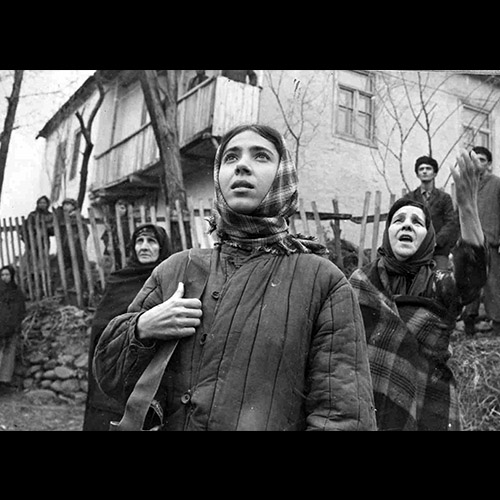
There are several Azerbaijani films that show us the lives of “fights” of the rear front without seeing the war. To cite an example: films “Shared bread”, “Our teacher Jabish”, “The sound of whistle flute”, (Original name: Tütək səsi) etc. produced in the Soviet era reflect World War II period. “Nabat” by Elchin Musaoghlu, “Sughra and sons” by Ilgar Najaf can be cited as modern films. None of these movies do not contain real combat scenes, we do not see the war, but we feel.
“Sugra and Sons” reminded me “The sound of whistle flute” with the details like black and white film, a single mother raising two sons, a father who went to war, a collective farm chairman and etc. Of course, despite these similarities, both films deal with different topics. The film “The Sound whistle flute” was released in 1975 by Rasim Ojagov based on the narratives of “The Sound of the whistle flute” and “Saz” by Isa Huseynov. In fact, this is the director’s second feature film although when Rasim Ojagov is mentioned, “Forgive me if I die” and “Tahmina” mostly come to mind.
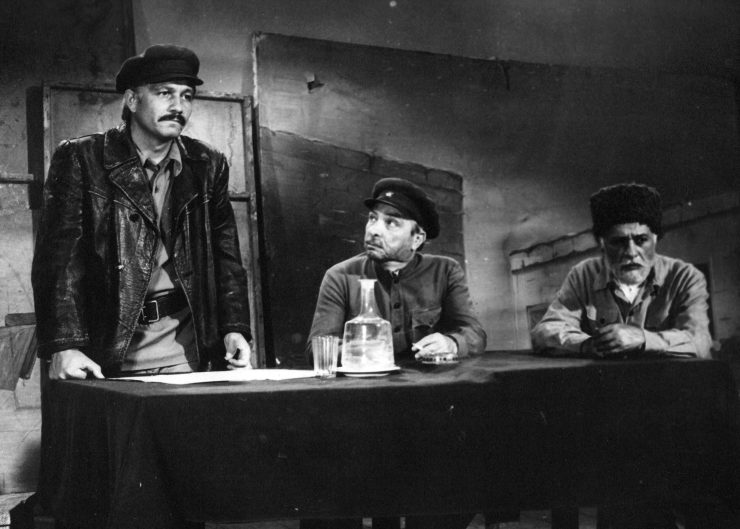
The film tells about the lives of Sayali and collective farm chairman Jabrayil, their relationship, and mainly the impact of the war on their as well as other people’s lives. Interestingly, each character has their own story here and it is difficult to say who is the protagonist. The film, which begins with Nuru’s voiceover, who introduces us the period and environment where the event took place, the village elder Isfandiyar and Jabrayil. Italian neorealism can be felt from the first frames of the film. But the scenes such as Tapdig sees his father in his dream, Isfandiyar chases after soldier when he comes, and raining while Jabrayil is working in the field add poetics to the film. The mass scene of the villagers returning from the field was portrayed in such a mood as if they were coming from a funeral. The slow cinema, gazing upon of people into the distance without speaking, Jumru’s whistle flute playing, dark colored clothes, and music demonstrate whole village`s mourning. These people are so focused on war and victory that they are ready to kill all feelings for the sake of it. As if they’re all running around the same ring. They are not able to accept someone`s differently living, thinking from them. They don’t want to give someone the right to be happy, show empathy towards and listen to their feelings.
While watching the film, it strikes that these people enjoy making a lot of noise with gathering together and reprimanding someone. Therefore, they ignore all the positive aspects of Jabrayil at one swoop. However, he is portrayed as more honest and soulful than anyone else in the film. He takes care of the whole village people. He even goes against their wishes and ensures that each of them is given a certain amount of grain. He instructs not to forget to provide milk to women with infants. Despite all this, even when he makes a fair decision, they do not accept it unambiguously. They underline that he is taking revenge on them, in fact, this is their opinion in their inner world.
Jabrayil took the position of Mukhtar who went to battle and died there. He carries out his duties in the (kolkhoz) collective farm. They were also close friends. Jabrayil was engraved on his heart his love for his friend for 20 years. Finally, after decades, the war gives him the chance to attain the love he has kept inside, and he does not leave this to chance. He chooses not to die, but living and being happy, but he also realizes at the end that the environment interferes with his happiness. He makes her proposal in the scene where he meets Sayali at her house. As a matter of fact, Sayali`s cloth hanging especially man T-shirt on a rope that is between themselves represent someone`s blocking between them all the time: the village community, hers sons, even Mukhtar, who died at war. But they take a brave step and try to be happy while starting a family. Obviously, this family is doomed to die on the vine from the beginning, because soldier’s family, his honor is accepted as sacrosanct. And main argument of people against this family is “soldier’s rectitude”.
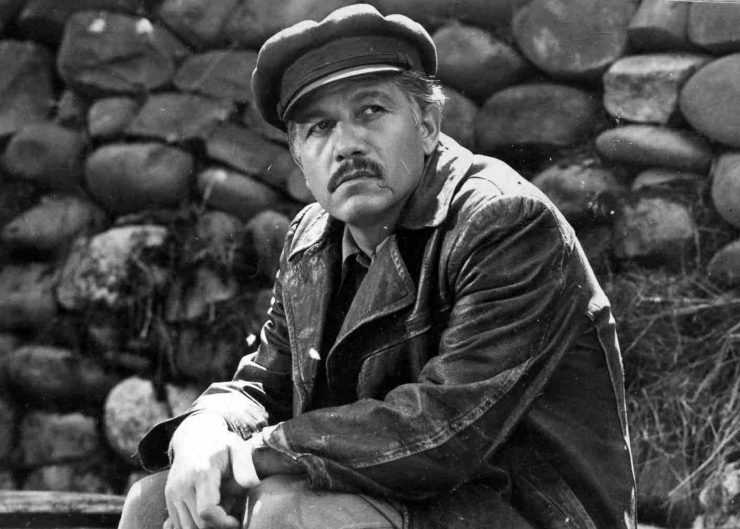
Under all these pressures, Sayali cannot keep her courage until the end. It is tough for her to recalcitrate both criticisms of the village community and her sons. People know that “black paper” was given, but they force Sayali to mourn for her dead husband. They do not accept that Mukhtar is no longer alive. They put a burden on those who stayed for life, and community members are so attached to those who leave so they do not want to accept those who come. When watching the film, it is perceivable that the author is against this marriage. Since he does not give any self-defense chances to Jabrayil at all. When Nuru talks about the men of the village who went to war, he praises Mukhtar more, while Jabrayil has benefited this village even more than him. As Jabrayil always mentioned, they founded the collective farm together with Mukhtar. He sends half a year’s salary to the war, works together with people in the field. He wishes from the bottom of his heart for Tapdig in order to be able to get education. Presumably, the author tries to endear Jabrayil to audience by such positive characters in one hand. He also shows that he cannot change the opinions of those around him on the other hand.
In the film, Isfandiyar is the only person who defends the love of Jabrayil and Sayali. His image is crafted as if jeweler’s precision. His inner turmoil, feelings as a father are conveyed very delicately. During the grain harvest, they start working after his blessing. He is known for his patience and soothing advice. Like Jabrayil, he also accepts the reality. After receiving his son’s death news, he took his saz (national instrument) and plays “Ruhani”. By this approach, he realizes that his son will not come again and “buries” him with this music.
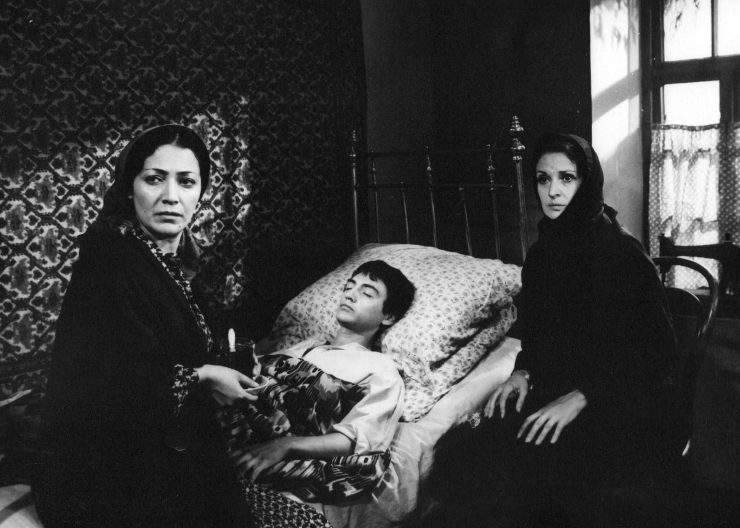
Like a father, he puts to eternal rest his son with quiet flowing tears. Isfandiyar confirms that he is the respected elder of the village with his every action. Sword Gurban, on the other hand, is a tough man. He knows people’s weaknesses and uses it if need be. Therefore, in one scene, “before, there was my awe (fear) over the crowd, so everything was in order. “Since the start of the war, the world turned into a mess” he mentions. In fact, the war is the cause for the “intermingling of the world”. He knows the pains of the war, sensitiveness of the name of a soldier and his family, and he uses all these to control people and tries to manipulate them in some way. Therefore, in the scene where people gather in front of Jabrayil’s house, he tells the widows to raise their hands. He tries to thrust Sayali forward. Actually, his “trial” is to manage the village and its people and gets his own way. This does not mean that he is an antagonist at all, he simply dictates the rules of his time. As he himself said, “he always says what people mention”
The interior set of the film – the rooms are half-dark, but the light falls from somewhere. As the fight between black and white, light and shadow, life, hope and the war… People live in the dark with the fear of losing relatives in the horror of war, but hope is still alive. The hope of winning, returning of their relatives … Even those who get “black paper”. (it was given to people whose son was killed at the war) It is essential to underline Teyyub Akhundov’s cinematographer ability. Whole film crew perceived what each member wanted to say.
Each frame reflects the rural reality. The atmosphere of that time has managed to preserve its “freshness” even now. Even during the shooting, in the scene of Jabrayil and Kılınc Gurbani, the villagers began to fight, thinking that the event was real. The director Mikhail was forced to call the police to protect in order to protect an actor Mikhail Volontir. Villagers` grain harvesting scenes are easy on the eye. People are reaping the rewards of their hard work – which creates a positive feeling. But Agshin Alizade’s music does not let the audience forget the war. The music given with such a rhythm makes the audience feel as if bullets are going to rain down from the sky and destroy everything. There is nerve-wracking music in the background while people do the hard work willingly, wholeheartedly during this entire period. When everything is finished and the grain is sent, this painful music stops and fatigued people come in sight behind. And now they are not as enthusiastic as before. On the contrary, they seem to get everything off their handshave.
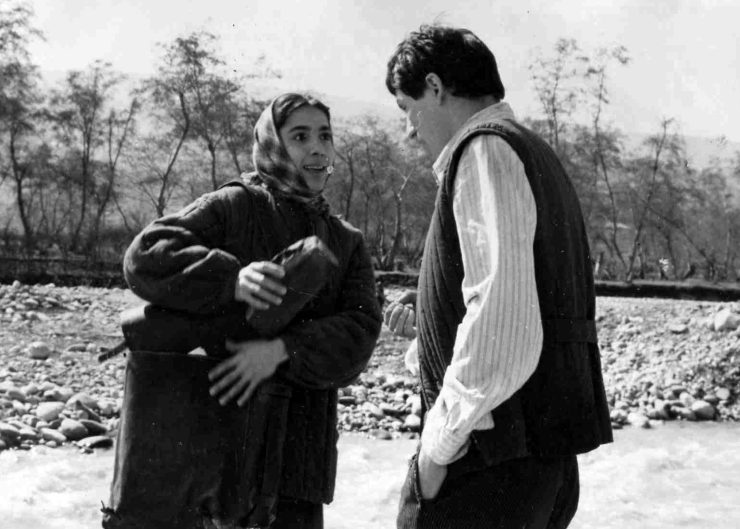
The film was not accepted by the artistic council in Moscow after its initial screening. The reason behind that is the scene where Jabrayil`s intention to beat youth. The director has to shoot that scene again. The film ends with an open finale. Such situations usually make us think about the movie long after it’s over. We see an unknown soldier coming from a distance and dozens of people waiting for him. Inevitably, we join them and wait anxiously who is coming? With this scene, the director screens the pain of these people who have been waiting for a long time. Their loved ones will always be looking and waiting for them, and those who return will remain unknown, because we do not know who and how will they return. As the Isfandiyar said, there is one demon of this age – war. But people don’t just die in battles, they sometimes die under spiritual burdens while alive
One of the things caught my eyes was some fancier women. And it was the first question came to my mind: why does a woman working hard in the field need the kohl (surma) in her eyes?! This is assumably the feeling of protecting their femininity in spite of everything.
The most effective fight against the war is Jumru’s silence and expressing his rebellion with whistle flute. (tutak)
Ulviyya Ahmadova
All photos were provided by the Azerbaijan State Film Fund in this article.
